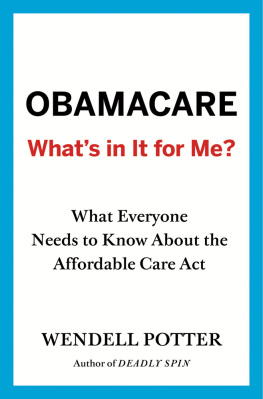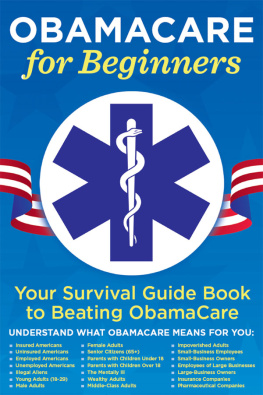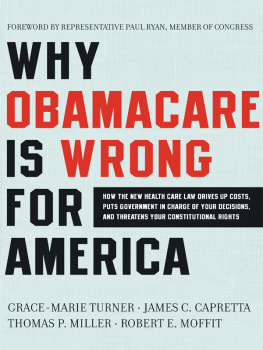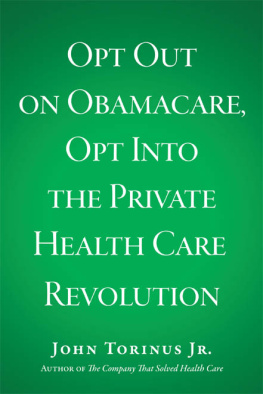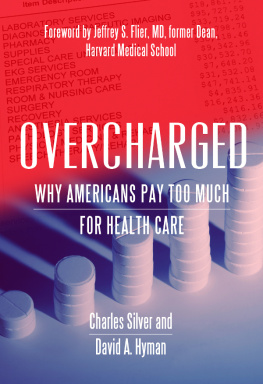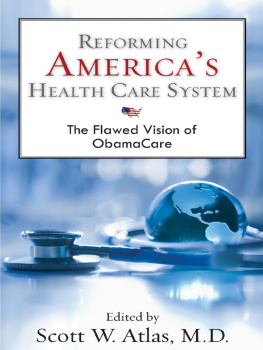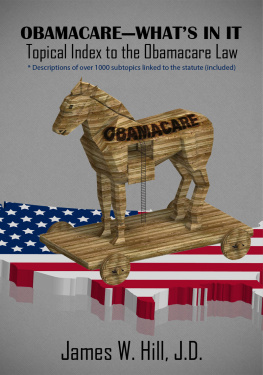OBAMACARE: WHATS IN IT FOR ME?
What Everyone Needs to Know About the Affordable Care Act
Wendell Potter
Bloomsbury Press
New York London New Delhi Sydney
Contents
Ready or notand like it or notthe Affordable Care Act (ACA), also known as the Patient Protection and Affordable Care Act and (colloquially) as Obamacare, is here. If it hasnt already made a difference in your life, it soon will. And, believe it or not, even if youre a small-government-loving member of the Tea Party or a -for-All liberal, youll eventually be glad we have it.
Some of the most important provisions of the lawthe ones that will force insurance companies to be more consumer-friendlytake effect on January 1, 2014, and all of us will benefit in one way or another. Among other things:
- Insurers will no longer be able to blackball any of usand declare us uninsurablebecause weve been sick in the past or were born with what industry executives call pre-existing conditions.
- They wont be able to charge women more than men or older folks nearly as much as theyve been able to get away with in the past.
- They wont be able to sell policies that provide little more than a fig leaf of coverage.
- Theyll no longer be able to baffle us with gobbledygook or hide important details about benefits and costs in fine print.
- And theyll have to compete for our business in a way that will make shopping for coverage much easier than ever before. Many of us will be able to buy policies that are much more affordable than in the past not only because of increased competition but also because of newly available tax credits and subsidies to help low- and middle-income Americans pay their premiums and out-of-pocket costs.
While these benefits are new, many individuals and families have been benefiting from the law for quite some time. Soon after the Affordable Care Act was signed into law in 2010, insurance companies could not deny coverage to children because of pre-existing conditions or kick them off their parents policies until they turned 26. Those changes alone reduced the ranks of the uninsured by more than 3 million. And beginning in 2011, insurance companies were required to spend at least 80 percent of what we pay in premiums on our health care instead of overhead and profits. If they dont, they have to send rebate checks to their policyholders. Americans have already saved billions of dollars from that provision alone.
As of October 1, 2013, millions of Americans who never dreamed they would be able to afford insurance have finally been able to do so through the new . Every stateeven the states that do not plan to expand their Medicaid programs in 2014and the District of Columbia now have health insurance marketplaces.
Those of us whove had health insurance all along should see the cost of our coverage moderate and the quality of our health care improve as insurers, large employers, small businesses, and health care providers all adjust to the new rules established by the Affordable Care Act.
To borrow a metaphor from one of President Obamas favorite pastimes, its as if the pickup basketball game that had been American health insurance suddenly acquired a referee, a scorekeeper, and out-of-bounds lines.
How will the ACA affect you and your family and how can you make the most of it? Thats what this book is all about. Ill describe the major provisions of the law and share some stories about how it is benefiting a great many people. People like my wife and me (baby boomers a few years away from Medicare), our 20- and 30-something kids, my elderly mom, and other folks we know and love. Folks like Tea Party cousin Hank in my home state of Tennessee and good friend Mary Ellen here in Philly, who started her own business after losing her corporate job a few years ago. Im confident that youll find yourself and people you know and love throughout this little book. And for those of you who want still more detail, the final section of the book offers a series of appendices, including a glossary and a list of resources that provide even more information.
Late in this book, youll find a conclusion discussing where we need to go from here. Ive often called the Affordable Care Act the end of the beginning of reform. Indeed, its a step forward, but we need to do more to make sure every American has access to care in the most appropriate setting at the most appropriate time. And there is much more we need to do to ensure that the United States of America, one of the richest countries on the planet, will finally be a leader, not the laggard it currently is, in global measures of health care quality and outcomes.
A note about the Obamacare technical difficulties you may have heard about: In the weeks when the healthcare exchanges created by the Affordable Care Act went live in October 2013, the media was filled with stories about problems consumers shopping for coverage on the individual market were encountering with balky websites like Healthcare.gov. At the same time, thousands of people were finding out from their insurance companies that their policies wont be available next year.
It was not surprising that such an enormous new undertaking serving millions of Americans might have some bugs. The implementation of Social Security in the 1930s and Medicare in the 1960s did not go seamlessly either, nor did the rollout of the Medicare Part D prescription drug program during the Bush administration. But anecdotes of people getting policy discontinuation notices and struggling to complete applications online or even over the telephone were widely reportedgleefully by anti-Obamacare pundits, anxiously by liberal supporters. Lost among the stories were many reports of ordinary folks who used the exchanges successfully, often finding they were able to secure better health insurance at significantly lower cost than what they had before. Many people who were never able to afford or even obtain health coverage now have it, thanks to the Affordable Care Act.
Nevertheless, in response to the widely expressed concerns, President Obama announced on November 12, 2013, that insurance companies would be able to keep their policyholders enrolled in health plans that do not meet the minimum standards established by the ACA, at least for another year. Many, but not all, insurance companies said they would do so if state insurance departments in the states where they do business would allow it.
If your state chooses not to allow insurance companies to renew such policies, then the thing to do is to shop for insurance in the marketplace.
If you are allowed to to keep such a policy for 2014, and choose to do so, when reading the rest of this book, think of your plan as having grandfathered status, meaning, that it is exempt from the new ACA requirements.
If youre still concerned about technical difficulties with Obamacare, heres my advice: dont be. Our country is great at problem solving, and the technical problems with implementing Obamacare are sure to be solved. Heres what to do right now: First, read this book so you know what you can expect from the Affordable Care Act and how it will affect you and your family and friends.
If you are shopping for insurance and are still having trouble enrolling online, you can apply three other ways:
1. Use the paper application (download it from Healthcare.gov).
2. Call 18003182596 (TTY: 18558894325 ) to talk with someone who can help you with your application.
3. Get in-person help from local resources (https://localhelp.healthcare.gov).
Keep in mind that even if your insurance company rescinds your discontinuation notice and allows you to stay enrolled in the plan you currently have, you still should check out other options. The odds are good that you will be able to find a policy that costs less and gives you better protection.
Next page
